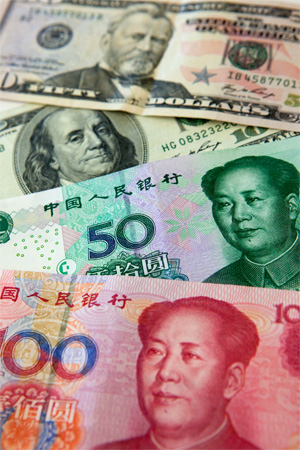Money
China increases holdings of US bonds
By Wang Bo (China Daily)
Updated: 2010-10-20 13:19
 |
Large Medium Small |
Move won't stop diversification of foreign exchange basket: Economists
BEIJING - China continued to increase its holdings of US Treasury bonds in August amid growing global demand for US debt, but economists said the move will not alter Beijing's strategy of diversifying its foreign exchange basket.
China remained the biggest foreign holder of US Treasury bonds, after its holdings climbed to $868.4 billion in August, up $21.7 billion from July, according to data released on Monday by the US Treasury Department.
|
 |
|
China remains the biggest foreign holder of US Treasury bonds, after its holdings climbed to $868.4 billion in August 2010. [Photo / Agencies] |
It is the second straight month that China increased its holdings of US Treasury bonds, but the total amount is still below the September 2009 peak of $938.3 billion.
"The monthly change in China's US Treasury bond holdings is simply an investment decision based on expectations of the short-term economic outlook and yields of different financial assets," said Wang Tao, chief China economist at UBS Securities.
"It does not necessarily mean that China has stopped diversifying its foreign exchange reserves away from investing in US assets," she said.
China was a major buyer of Japanese and South Korean debt earlier this year.
But net purchases of US Treasury bonds in the past two months and the sale of Japanese bonds in August had sparked speculation that, faced with an uncertain global economic outlook, the country had suspended diversifying its $2.45 trillion foreign reserves.
After months of record net purchases, China cut its Japanese debt holdings by a net 2.02 trillion yen ($24.5 billion) in August- the biggest single-month sale since 2005.
"In the long run, China should try to reduce the share of dollar assets in its total foreign exchange reserves steadily and that might not lead to a massive sale of US Treasuries as China's foreign exchange reserve is still rising," Wang said.
Overall, global investors' enthusiasm for US debt has returned recently as fears over inflation intensified following anticipation of further monetary easing by the Federal Reserve to stimulate the ailing economy.
Net purchases of Treasuries rose to $117.1 billion in August, up from $30 billion in July, representing the biggest buying of US government debt since last November.
"When the economic outlook remains uncertain, risk aversion sentiment sweeps the global market. Investors tend to choose less risky assets for stable returns," said Zhao Xijun, a finance professor at Renmin University of China.



